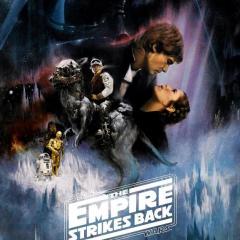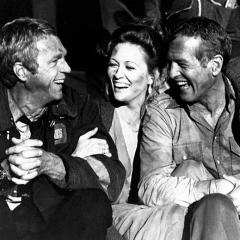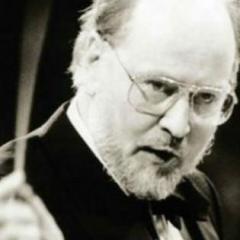Leaderboard
Popular Content
Showing content with the highest reputation on 14/09/14 in all areas
-
I was recently directed to TWO new free e-books on film music analysis self-published online just last year by a composer and university lecturer named Brian Morrell: http://www.brianmorrell.co.uk/filmbooks.html Lots of great examples (including many Williams) are taken apart here - and he clearly has access to scores! With over 700 pages worth of material, it's a phenomenal resource for anyone interested in film music, from either a compositional or analytical standpoint. And many of the insights are quite sophisticated, though the text is written in a very accessible way. Morrell even states in his bio that he aims to write a third volume. Enjoy!1 point
-
On impulse, I gave it a 7. It's a very good score, but I think I've always sold it a bit short because of all the baggage it carries—i.e., the general "It's TITANIC!" vibe, Celine Dion crooning the love theme to death, that kind of thing. If it had been just another movie without all the hype, I probably would've had a much more open-minded disposition toward it. I admit, it's not a very fair perspective. Just the general impression I have. Again, though, I do think it's a very good score. Not Horner's best—frankly, I think a film as big as this did deserve real vocals and a full orchestral job throughout—but it was certainly up to the job at hand. I really like the material in port and leaving port, and the final sequences of the film recalling her life, heading below the surface, and her reappearance in the stairwell hall. I do think it's a beautiful love theme, but (as I said) it's been tainted by overplay, and I've never thought it superior to the romantic material in Braveheart. (And the notion that nothing better has been written since is just silly.) I agree with this. Another composer might've gone overboard on the epic scale, but I think Horner plays it right by keeping things on a more intimate level—reflecting the individual perspective of the larger event. Also . . . I don't know where people got it in their heads that Horner is an arrogant guy. I've always seen him as very humble, ingenuous, and understanding that it's about what the director wants, not just the creative impulses of the composer. The reason he and Cameron clashed on Aliens wasn't creative differences; it was because what Cameron was asking for was a physical impossibility. And Horner's response to Cameron and Gale Ann Hurd, when they demanded more than he could give, was absolutely perfect. He managed to push back and still remain completely humble about it. Ultimately, he was the right person for this job, and absolutely deserved the Oscar he got for it. Because it is a good score . . . and because, hey, it's TITANIC!1 point
-

What is the last Television series you watched?
Dixon Hill reacted to Sir Hilary Bray for a topic
Rounded off 3rd Rock last night. Fine, fine comedy. Always enjoy the Don/Sally moments and whatever Lithgow does. In a way miffed how it ended but then them staying on Earth was never in the cards. Z1 point -

What Is The Last Film You Watched? (Older Films)
Sweeping Strings reacted to Sir Hilary Bray for a topic
not too bad indeed, especially the pilloring of Escape to Victory which I've only ever seen the end of and features Rent-a-German (to borrow an Ed Bishop phrase and para-that phrase) Anton Diffring. I should...change my username, Blunters1 point -
There must be half a dozen themes in the Williams and LotR scores alone that are as good as Rose's theme. The fact that the movie did so well helped the score get its status. Same with PotC.1 point
-

How do we feel about James Horner's Titanic?
bollemanneke reacted to MikeH for a topic
Terrific score. I don't know how many have seen the following interview with Don Davis from years ago, but I thought it provided some interesting insight into the scoring process. http://www.ign.com/articles/2000/07/17/interview-with-composer-don-davis-part-3-of-4 PLUME: On a side note to Horner, you worked with him on Titanic. There was a very famous rift between Horner and James Cameron after Aliens. Was any residual of that evident in what you observed between Horner and Cameron on Titanic? It was originally a falling out based on their differing views on the music for Aliens, wasn't it? DAVIS: No, I think it was a little more than that. It was music too, but Jim Cameron is a very tough guy to work for. Actually, I gained a lot of respect for Horner during Titanic, because Horner was accommodating Cameron in ways that I thought a composer the stature of Horner had no reason to accommodate anyone. He completely handled the situation with absolute humility and professionalism. I don't think there are very many composers who would have acquiesced to Jim Cameron the way Horner did. Horner gave Jim exactly what he wanted. I think there are some people who think that the Titanic score may be overly simplistic, or some people object to the Celtic nature of it, or whatever, but I can tell you that if any other composer had scored that picture, Jim would have fired him and at least four other composers before he got what he wanted. Horner was determined that that would not happen, and it didn't happen, and I think it was the best score that Jim would ever allow into that picture. For that reason, I think he deserves all the Academy Awards and accolades that he got. PLUME: I think that's a perspective that not very many people saw in that. DAVIS: Well, you kind-of had to be there to see it. I mean, it was magnificent. PLUME: It was surprising to a lot of people that Horner would even work with Cameron again after Aliens. DAVIS: I can't really say, because I wasn't there all that much. I would go to Horner's place, pick up the sketches, he'd talk me through them, I'd do them, and I was done. I do know that I made a lot of extra money on that show, because the picture kept changing and Cameron kept making changes, and as the sketches changed, they kept coming back to me to change the orchestration and I'd get more money. That was just fine as far as I was concerned. Through that process, I could see that he was accommodating this director. He was really bending over backwards to do everything that Jim wanted him to do. I couldn't picture a composer of the stature of John Williams doing that, well, maybe he would but there gets to be a point when it's too much. PLUME: Isn't it the job of the composer to conform to the director's view of the film? What line is there that demarcates when it's not worth the hassle? DAVIS: There are situations where directors give composers directives just to give them directives. Just to show "who's boss in this room." PLUME: Is it the film version of busy work? DAVIS: Sure. Go outside and dig a 20-foot hole and then fill it up again. Composers, whether they are or not, certainly like to view themselves as being creative and having a contribution to make to the process. There are some personalities, fortunately they are few, that seem to want to negate that. There's a point where it becomes too much of an insult to bear. If a composer is very highly successful, and James Horner certainly is, that means that he has to take less of that kind of abuse than a composer who is not of that stature. From my limited vantage point, it seemed like changes were coming in just for the sake of changes to come in, and I was wondering, as I was picking up these changed sketches, why Horner was going to such lengths to make this guy happy. Once the film came out, I understood perfectly. That's another tribute to James Horner, because he has not only an amazing visceral insight into what a film needs musically, but he knows how these situations work and he knows when to do something and when not to do something. You've got to hand it to the guy.1 point -
Walt Disney Records The Legacy Collection
Bilbo reacted to Sharkissimo for a topic
No love for STAR WARS? Seriously? I don't think STAR WARS is classified as a "kiddie" film. I don't give a shit what fanboys classify it as. It's a kiddie film. Plain and simple.1 point -

Walt Disney Records The Legacy Collection
The Illustrious Jerry reacted to Sir Hilary Bray for a topic
Seeing the words "Toy Story (20th)" sent a shiver down my spine. Where has the time gone?1 point -
1 point




